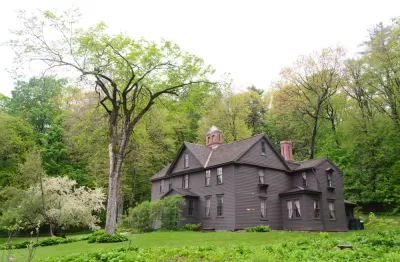A pair of articles mine the films nominated for Academy Award for lessons in design and development that could potentially benefit housing equality.

Carolina Miranda writes for the Los Angeles Times and Jenny Schuetz for Brookings, both riffing on the subject of the built environment in films nominated this year for Academy Awards.
Miranda tackles the entire crop of Best Picture nominations, starting with the "Minimalist manse inhabited by the well-to-do Park family in Bong Joon Ho’s [eventual winner] 'Parasite.'" Written before that film swept its way to a resounding and record-breaking evening, Miranda finds a common theme in each film's use of architecture to tell its story: "Taken collectively, however, the best-picture nominees deploy architecture in ways that tell compelling stories about the ways in which the poor and the wealthy divide."
Schuetz's article hones in on "Little Women" for lessons in housing development, from Schuetz's well documented pro-development perspective. So, in Schuetz's view, the lessons of the houses in the film read as follows: 1) Middle-Class Homes Do Not Drag Down Property Values of Nearby Mansions, 2) Waiving Quality Standard Allows Low-Income Families to Live in Expensive Communities, and 3) Bring Back the Urban Boarding House!
FULL STORY: How the Oscars’ best-picture nominees used architecture to tell stories of inequity

Planetizen Federal Action Tracker
A weekly monitor of how Trump’s orders and actions are impacting planners and planning in America.

Maui's Vacation Rental Debate Turns Ugly
Verbal attacks, misinformation campaigns and fistfights plague a high-stakes debate to convert thousands of vacation rentals into long-term housing.

Restaurant Patios Were a Pandemic Win — Why Were They so Hard to Keep?
Social distancing requirements and changes in travel patterns prompted cities to pilot new uses for street and sidewalk space. Then it got complicated.

In California Battle of Housing vs. Environment, Housing Just Won
A new state law significantly limits the power of CEQA, an environmental review law that served as a powerful tool for blocking new development.

Boulder Eliminates Parking Minimums Citywide
Officials estimate the cost of building a single underground parking space at up to $100,000.

Orange County, Florida Adopts Largest US “Sprawl Repair” Code
The ‘Orange Code’ seeks to rectify decades of sprawl-inducing, car-oriented development.
Urban Design for Planners 1: Software Tools
This six-course series explores essential urban design concepts using open source software and equips planners with the tools they need to participate fully in the urban design process.
Planning for Universal Design
Learn the tools for implementing Universal Design in planning regulations.
Heyer Gruel & Associates PA
JM Goldson LLC
Custer County Colorado
City of Camden Redevelopment Agency
City of Astoria
Transportation Research & Education Center (TREC) at Portland State University
Jefferson Parish Government
Camden Redevelopment Agency
City of Claremont





























